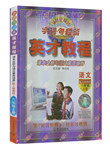题目内容
He said to me,“You should do the right thing ________ the right time.”
- A.at
- B.in
- C.by
- D.for

 新编小学单元自测题系列答案
新编小学单元自测题系列答案 字词句段篇系列答案
字词句段篇系列答案It was Monday. Mrs. Smith's dog was hungry, but there was not any meat in the house.
Considering that there was no better way. Mrs. Smith took a piece of paper, and wrote the following words on it:“Give my dog half a pound of meat.” Then she gave the paper to her dog and said gently:“Take this to the butcher(* person whose job is selling meat)and he's going to give you your lunch today.”
Holding the piece of paper in its mouth, the dog ran to the butcher's. It gave the paper to the butcher. The butcher read it carefully, recognized that it was really the lady's handwriting and soon did it as he was asked to. The dog was very happy, and ate the meat up at once.
At noon, the dog came to the shop again. It gave the butcher a piece of paper again. After reading it, he gave it half a pound of meat once more.
The next day, the dog came again exactly at noon. And as usual, it brought a piece of paper in the mouth. This time, the butcher did not take a look at paper, and gave the dog its meat, for he had regarded the dog as one of his customers(*people who buy sth. from a shop).
But, the dog came again at four o'clock. And the same thing happened once again. To the butcher's more surprise, it came for the third time at six o'clock, and brought with it a third piece of paper. The butcher felt a bit puzzled. He said to himself, “This is a small dog. Why does Mrs. Smith give it so much meat to eat today?”
Looking at the piece of paper, he found that there were not any words on it!
【小题1】Mrs. Smith treated her little dog quite____.
| A.cruelly | B.fairly | C.kindly | D.friendly |
| A.might do it much harm | B.could do it much good |
| C.would help the butcher | D.was worth many pounds |
| A.before he felt sure that the words were really written by Mrs. Smith |
| B.when he found that the words on the paper were not clear |
| C.because he had sold out all the meat in his shop |
| D.until he was paid enough by Mrs. Smith |
| A.only the paper with Mrs. Smith's words in it could bring it meat |
| B.the butcher would give the meat to it whenever he saw it |
| C.Mrs. Smith would pay for the meat it got from the butcher |
| D.a piece of paper could bring it half a pound of meat |
| A.the dog was clever enough to write on the paper |
| B.the dog dared not go to the butcher's any more |
| C.the butcher was told not to give any meat to the dog |
| D.the butcher found himself cheated by the clever animal |
A traveler hurried down to the hall of an American hotel and went to the cash-desk. He had just 15 minutes to pay his bill and get to the station. Suddenly he remembered that he had left something in his room.
"Look here, boy," he said to the bellboy, "run up to my room and see if I have left a parcel on the table there. Be quick about it."
The boy ran upstairs. Five minutes passed. The traveler was walking up and down the hall, looking very angry. At last the boy appeared.
"Yes, sir," he reported to the traveler," you have left the parcel there, it's right on the table in your room."
【小题1】 The traveler _______.
| A.ran down the street |
| B.came downstairs hurriedly |
| C.ran so quickly that he fell down |
| D.came into the hotel hall very quickly |
| A.He had to pay his bill and arrived at the station in 15 minutes . |
| B.It took him 15 minutes to go to the station from the hotel. |
| C.He could pay his bill in 15 minutes and then go to the station . |
| D.He had nothing but 15 minutes. |
| A.a boy whose work is to ring the bell |
| B.a boy who plays with a bell |
| C.a boy whose work in a hotel is to help guests with their bags |
| D.the hotel owner's boy |
| A.to go upstairs |
| B.to look for his parcel |
| C.to fetch the parcel he had left in his room |
| D.only to see if the parcel was on the table in his room |
| A.ran up to the room |
| B.came downstairs |
| C.reported to the traveler in the room |
| D.came down to the hall but brought nothing back |
A famous teacher was speaking to the students at our school. He began his lesson by holding up a £100 bill. Then he said to the three hundred students, "Who would like to have this £100 bill?" The students began to put up their hands at once.
Then he said, "I am going to give this bill to one of you, but first, let me do this." He then made this bill into a ball. Then he said, "Who wants it?" Hands went into the air.
"Well," he said, "What if I do this?" and he dropped it on the floor and stepped on it. He picked up the dirty, crumpled bill and said, "Who still wants it?" Hands went back into the air.
"My friends," he said, "You've learned a valued lesson today. No matter what I did to the money, you still wanted it because it didn't go down in value. It was still worth £100.
Many times in our lives, we're dropped, crumpled, and stepped on by the chances we take and the things that happen to us. We feel as if we are worth nothing. But remember, no matter what has happened to you, you will never lose your value. You are always valuable to those who love you. Your value doesn't come from what you drop or whom you know,but WHO YOU ARE .
You are special and valuable. Don't ever forget it!
【小题1】The story happened ______.
| A.when the teacher gave the students some advice on how to learn English |
| B.when the students were having a meeting |
| C.when the teacher gave the students a speech |
| D.when the students were discussing something interesting with their teachers |
| A.went up in value | B.was worth much |
| C.didn't reduce in value | D.was still ours |
means_______.
| A.the students put up their hands again |
| B.the students put down their hands |
| C.the students agreed to what the teacher said |
| D.the students put their hands in front of them |
| A.Because he wanted to give a lecture about money. |
| B.Because he was used to dropping a bill on the floor and stepping on it. |
| C.Because he was going to give the bill to one of the students. |
| D.Because he wanted to make the students know what the value was. |
| A.£100 bill is worth the same no matter what you do with it. |
| B.All people love money most. |
| C.Your value doesn't change no matter what happens to you. |
| D.The value of money changes when it is made dirty. |